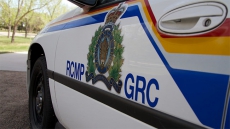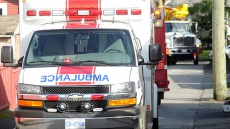BELLA BELLA, B.C. — Blustery, wet weather thwarted efforts Thursday to assess the fallout of a sunken tugboat leaking diesel in a remote region off British Columbia's central coast.
All small boats involved in the salvage effort were ordered to stand down at midday, including crews responsible for environmental sampling, wildlife surveys and shoreline assessment for eventual clean-up operations.
Crews have recovered more than 88,000 of the estimated 200,000 litres of fuel from the Nathan E. Stewart, which ran aground and sank Oct. 13 in Seaforth Channel, about 20 kilometres west of Bella Bella.
A situation report released Thursday afternoon said divers located diesel on the roof of the engine room, which they intend to vacuum out before emptying the boat's submerged fuel tanks.
Some experts say the spill is a wake-up call as the provincial and federal governments consider giving permission for larger vessels carrying far greater volumes of fuel in Canada's West Coast waters.
Peter Hodson, an ecotoxicologist and professor of environmental studies at Queen's University in Kingston, Ont., said bad weather is "endemic" in the region.
"That to me indicates that they're going to have to have more resources that are better capable of responding in bad weather because chances are, most of the accidents are going to occur in bad weather," said Hodson, who was part of an expert panel cited in a Royal Society of Canada report published last November that looked into the effects of oil spills in aquatic ecosystems.
Aquatic ecologist Stella Swanson, also cited in the report, called for the distribution of additional spill-response equipment to more isolated coastal regions.
She described it as a "societal decision" that depends on the extent to which Canadians are willing to pay for on-the-ground readiness closer to remote areas.
But not all experts feel the same way.
Steven Candito, an oil-spill consultant based in the United States who commended the current regulations in Canada and in the U.S., said spending more on disaster response doesn't make sense.
That money would be better spent elsewhere, such as on spill prevention or the rehabilitation of already polluted regions, he said.
Candito did call on the government and industry to incorporate new technology into the regulatory framework, such as drones that could be deployed to gather visual data quickly and map the extent of an oil spill.
A spokeswoman for Kirby Offshore Marine, the owner of the sunken tug, said there was no timeline for how long the assessment and clean-up operation would take.


